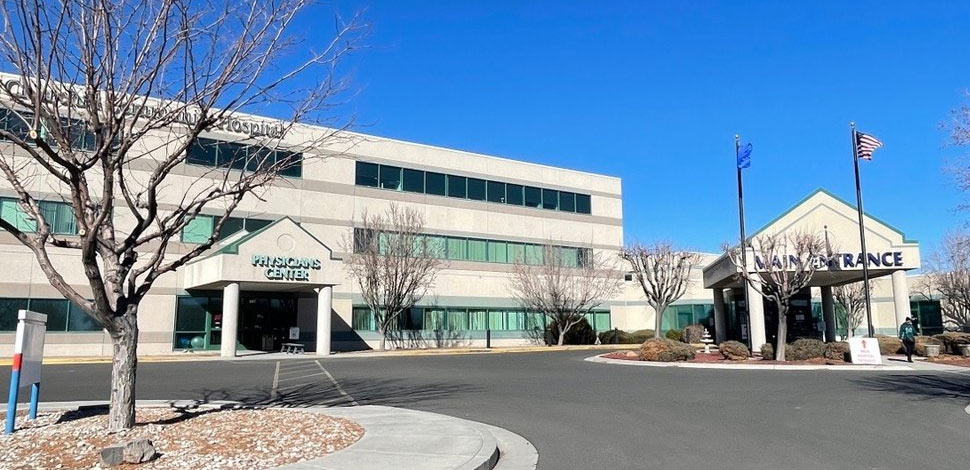Buscar
Results for ''s'
Clear-
5 Things to Know About Women’s Heart Disease
Heart disease is more common in women than many people think. In fact, it is the leading cause of death in the United States, ahead of cancer and stroke. However, the common signs and symptoms we often associate with men and heart disease don’t always align with women. Thankfully, Renown Health is home to the first women’s heart center in Nevada. The Helaine Greenberg Women’s Heart Center gives women in our community the opportunity to receive exemplary care and education. “At the Women’s Heart Center, we are proud to offer the women of our community the treatments, therapies and education they need to fight this silent killer,” Dr. Danish Atwal. 1. The warning signs for heart disease present differently in women than they do in men. Both men and women may experience chest pain during a heart attack, but the similarity of symptoms ends there. Heart disease is especially problematic for women because more than half of women who die of heart disease have no symptoms at all. Women tend to have subtler symptoms that mimic symptoms associated with common, mild illnesses: Fatigue or weakness Pain, pressure or tightness in the center of the chest Pain that spreads to the upper body, neck or jaw Sweating, nausea or vomiting Sudden dizziness Shortness of breath Trouble sleeping 2. Women are often not treated with the same medications as men, even when they should be. Women are less likely to receive heart medication because their disease is often misdiagnosed or because they do not seek proper care. According to a study done by Harvard Health Publishing in 2020, “A general lack of awareness of women’s heart disease may lead to doctors or patients missing heart attacks in women or delaying their diagnosis. For example, while the frequency of cardiovascular disease tends to be lower in women before menopause than in men, the frequency dramatically increases after menopause, when it accounts for approximately one out of every three deaths in women. 3. Women who have hypertension, high cholesterol, type 2 diabetes or gestational diabetes during pregnancy are at a higher risk of a heart attack in the future. Women who experienced complications related to developing high blood pressure or hypertension during pregnancy had a 63% increased risk for developing cardiovascular disease later in life, as stated by research funded by the National Heart, Lung, and Blood Institute. According to that same study, researchers found that early screenings and monitoring in four target areas – blood pressure, cholesterol levels, glucose levels and body mass index – could provide even more personalized targets to help delay or possibly prevent future cardiovascular events among women.
Read More About 5 Things to Know About Women’s Heart Disease
-
 Renown Institute For Heart & Vascular Health - South CarsonRenown Institute For Heart & Vascular Health - South CarsonHorarios
Renown Institute For Heart & Vascular Health - South CarsonRenown Institute For Heart & Vascular Health - South CarsonHorarios
Mié.8 a.m. - 4 p.m.Thu-TueCerrado -
Renown Health Nationally Recognized for Commitment to Providing High-Quality Stroke Care With Three American Heart Association Recognitions
The American Heart Association presents Get With The Guidelines®- Stroke Gold Plus awards for proven dedication to ensuring all stroke patients have access to best practices and life-saving care. Renown Health emergency, medical and surgical providers have received three American Heart Association’s Get With The Guidelines® awards. These awards demonstrate commitment to ensuring stroke patients receive the most appropriate treatments according to nationally recognized, research-based guidelines; reducing disabilities and increasing the number of lives saved. Every 40 seconds, someone in the U.S. has a stroke. Los derrames cerebrales son la quinta causa principal de muerte en los EE. UU. y la principal causa de discapacidades en adultos. Studies show patients recover better when providers consistently follow treatment guidelines. Get With The Guidelines puts the expertise of the American Heart Association and American Stroke Association to work for hospitals nationwide, helping ensure patient care is aligned with the latest research and evidence-based guidelines. “A stroke is an extremely serious condition that requires emergent medical treatment. The faster treatment is provided, the lower the risk of brain injury. We are proud of our thousands of physicians, nurses and clinicians who consistently practice exceptional patient care by adhering to the latest treatment guidelines,” said Brian Erling, MD, MBA, President and CEO, Renown Health. “Get With The Guidelines makes it easier for our teams to put proven knowledge and consistent protocols to work on a daily basis, which studies show can help people live longer and better lives.” “As a participant in Get With The Guidelines programs, Renown qualified for the awards by demonstrating that physicians and clinicians across our integrated health system are committed to improving quality care for stroke patients,” said Bill Plauth, MD, MMM, CPE, Chief Medical Officer for Renown Health and Associate Dean for Clinical Affairs at the University of Nevada, Reno School of Medicine. “If you or a loved one is experiencing a stroke, call 911, as you need skilled medical care immediately. Stroke care focuses on helping people recover as much function as possible and return to independent living. The Renown Neurovascular and Stroke Program and Renown Rehabilitation Hospital teams provide expert emergency stroke care and comprehensive neurovascular care and rehabilitation services.” “We are pleased to recognize Renown Health for its commitment to caring for those in their community who need cardiovascular care,” said John Warner, MD, FAHA, past president of the American Heart Association and CEO of The Ohio State University Wexner Medical Center. “Hospitals that follow the American Heart Association’s quality improvement protocols often see improved patient outcomes, fewer readmissions and lower mortality rates – a win for health care systems, families and communities.” “Renown Regional Medical Center is the only designated Comprehensive Stroke Center in northern Nevada,” says Benjamin Pence, DO, Director, Institute for Neurosciences at Renown. “This means that we have the highest level of certification to receive and treat the most complex stroke cases. Our Institute for Neurosciences team is led by the area's top neurologists, and we conduct research studies involving new ways of preventing, diagnosing, and managing neurological disorders. We care for patients suffering from nerve and brain disorders due to stroke, headache, epilepsy, and other acute causes. We also monitor and develop treatment options for patients with memory and movement disorders such as Alzheimer’s, Parkinson's Disease or Multiple Sclerosis.” Renown Health also received the American Heart Association’s Target: Stroke Honor Roll Elite award. To qualify for this recognition, hospitals must meet specific criteria that reduce the time between an eligible patient’s arrival at the hospital (within 60 minutes or less) and treatment for at least 85 percent of applicable patients. “It is an honor to be among the American Heart Association’s Stroke Honor Roll Elite award recipients,” said Bret Frey, MD, president of Northern Nevada Emergency Physicians Care teams at Renown Health. “We adhere to these rigorous guidelines daily and demonstrate our unwavering commitment to ensuring more people in northern Nevada receive leading emergency and trauma care and the gift of extended, healthier lives.” Renown Health also received the American Heart Association’s Target: Type 2 Diabetes Honor Roll - Stroke award. Target: Type 2 Diabetes aims to ensure patients with Type 2 diabetes, who might be at higher risk for complications, receive the most up-to-date, evidence-based care when hospitalized due to stroke. This award is given to hospitals that qualify for the silver level or higher achievement award within the Get With The Guidelines – Stroke program and achieve an overall Diabetes Cardiovascular Initiative Composite Score of more than 80 percent. About Renown Health Renown Health is Nevada’s largest, not-for-profit integrated healthcare network serving Nevada, Lake Tahoe, and northeast California. With a diverse workforce of more than 7,000 employees, Renown has fostered a longstanding culture of excellence, determination, and innovation. The organization comprises a trauma center, two acute care hospitals, a children’s hospital, a rehabilitation hospital, a medical group and urgent care network, and the locally owned not-for-profit insurance company, Hometown Health. To join the Renown team, visit renown.org/careers. About Get With The Guidelines Get With The Guidelines® is the American Heart Association/American Stroke Association’s hospital-based quality improvement program that provides hospitals with the latest research-based guidelines. Desarrollado con el objetivo de salvar vidas y acelerar la recuperación, Get With The Guidelines ha influido en la vida de más de 12 millones de pacientes desde 2001. For more information, visit heart.org.
-
Women's Heart Center
Heart disease is the leading cause of death in women. According to the American Heart Association, heart disease kills more women than all forms of cancer combined and yet only 44% of women recognize that cardiovascular disease is their greatest health threat. Recognizing the urgent need for women's cardiac care, Renown Health established the Helaine Greenberg Women's Heart Center, the first of its kind in Nevada.
-
Las mujeres y los ataques cardíacos: signos sutiles que debe conocer
Heart disease is the number one killer of women – claiming one life every minute – yet many women don’t know that the signs of heart attack may not be the same symptoms they’ve learned about all their lives. In women, nearly 71% experienced unusual exhaustion in the weeks before, 50% had trouble sleeping and 42% suffered shortness of breath. Most importantly, about 43% had no chest pain. Women and Heart Attacks: The Subtle Symptoms In both men and women, the most common symptom is pressure or pain in the mid chest, but there are also more subtle signs. “Women can experience a heart attack without chest pain,” explains Letitia Anderson, M.D., cardiologist with Renown Institute for Heart & Vascular Health. “It is not uncommon for women to experience extreme fatigue, shortness of breath, dizziness, lightheadedness, nausea, vomiting and pain in the abdomen or back as their primary symptom.” Other symptoms can include: Neck or jaw pain Fullness or pressure that goes away and comes back The feeling of a rope being tied around your body and squeezed Some doctors have reported seeing patients who just didn’t "feel right." One woman simply felt more tired than usual while cleaning, while another woman reported feeling winded carrying boxes to the basement. Admittedly these are symptoms many of us would shrug or sleep off versus going to the hospital for immediate care, which is why it’s important to pay close attention to the warning signs. “Women are good at being the caregiver for the rest of the family and writing off their own symptoms as something minor, like indigestion or a muscle pull,” says Dr. Anderson. “Remember that heart attacks have early warning signs, and if they are recognized and treated in time, a heart attack can be prevented and heart damage avoided.” When You Need to Call 911 Paying attention to your body is key. If you’ve experienced any unusual or flu-like symptoms, struggled to breathe or just don’t feel right – give yourself a gut check and ask if you’ve honestly felt this way before. If you’re worried at all, you need to seek emergency care. Do not wait – call 911 immediately Take an ambulance to the hospital if at all possible Try to stay calm and take deep, slow breaths until medical help arrives.
Read More About Women and Heart Attacks: Subtle Signs to Know
-
Renown Health Is Nationally Recognized for Its Commitment To Providing High-Quality Heart Failure Care With Three American Heart Failure Recognitions
Renown Health Cardiology has received the American Heart Association’s Get With The Guidelines® - Heart Failure Gold Plus quality achievement award for its commitment to improving outcomes for patients with heart failure, meaning reduced readmissions and more healthy days at home. The heart care team also received Target: Heart Failure Honor Roll and Target: Type 2 Diabetes Honor Roll. About 6 million U.S. adults are living with heart failure (HF), a number that is expected to increase to more than 8 million by 2030. Despite the name, HF doesn’t mean that the heart has stopped working – it means the heart is having a hard time pumping blood and oxygen throughout the body. While there’s no cure for HF, patients can live a quality life by working with their health care team to create and stick with a plan that may include medication, symptom monitoring and lifestyle changes. The Get With The Guidelines - Heart Failure quality achievement award is earned by hospitals that demonstrate a commitment to treating patients according to the most up-to-date guidelines as outlined by the American Heart Association. Get With The Guidelines puts the expertise of the American Heart Association to work for hospitals nationwide, helping ensure patient care is aligned with the latest research- and evidence-based guidelines. The program aims to increase healthy days at home and reduce hospital readmissions for heart failure patients. “Renown Health is committed to improving patient care by adhering to the latest treatment guidelines,” said Jayson Morgan, MD, Director of Cardiovascular Services at Renown Health. “Get With The Guidelines makes it easier for our teams to put proven knowledge and guidelines to work on a daily basis, which studies show can help patients recover better. The end goal is to ensure more people in northern Nevada can experience longer, healthier lives.” Each year, program participants qualify for the award recognition by demonstrating how their organization has committed to providing quality care for HF patients. In addition to following treatment guidelines, Get With The Guidelines participants also provide education to patients to help them manage their HF at home. “We are pleased to recognize the leaders and teams at Renown Health for a strong commitment to caring for people with heart failure,” said Clyde W. Yancy, MD, MSc, MACC, FAHA, MACP, FHFSA, national chairperson of the American Heart Association Heart Failure systems of care advisory group and chief, division of cardiology at Northwestern University, Feinberg School of Medicine. “Hospitals that participate in Get With The Guidelines quality improvement programs often see better patient outcomes, fewer readmissions and lower mortality rates – a win for health care systems, families and communities.” Renown Health is also recognized on the American Heart Association’s Target: Heart FailureSM Honor Roll. Hospitals on the Honor Roll meet specific criteria that improves medication adherence, provides early follow-up care and coordination and enhances patient education. The goal is to further reduce hospital readmissions and help patients improve their quality of life in managing this chronic condition. Renown Health additionally received the American Heart Association’s Target: Type 2 Diabetes Honor Roll™ award. Target: Type 2 Diabetes aims to ensure patients with Type 2 diabetes, who might be at higher risk for complications, receive the most up-to-date, evidence-based care when hospitalized due to heart disease or stroke. About Renown Health Renown Health is Nevada’s largest, not-for-profit integrated healthcare network serving Nevada, Lake Tahoe, and northeast California. With a diverse workforce of more than 7,000 employees, Renown has fostered a longstanding culture of excellence, determination, and innovation. The organization comprises a trauma center, two acute care hospitals, a children’s hospital, a rehabilitation hospital, a medical group and urgent care network, and the locally owned not-for-profit insurance company, Hometown Health. Renown is currently enrolling participants in a community-based genetic population health study, the Healthy Nevada Project®. Acerca de Get With The Guidelines Get With The Guidelines® es el programa de mejora de calidad hospitalaria de la Asociación Estadounidense del Corazón y la American Stroke Association que proporciona a los hospitales las últimas pautas basadas en la investigación. Desarrollado con el objetivo de salvar vidas y acelerar la recuperación, Get With The Guidelines ha influido en la vida de más de 12 millones de pacientes desde 2001. For more information, visit heart.org.
-
Atención cardíaca
We lead the region in cardiology care with our technological expertise and patient-centered approach. Our comprehensive team diagnoses heart disease and other cardiac conditions, offering personalized treatment plans. Plus, our specialty team provides you access to the most advanced medical, surgical and minimally invasive techniques.
-
 Renown Institute For Heart & Vascular Health - FallonRenown Institute For Heart & Vascular Health - FallonHorarios
Renown Institute For Heart & Vascular Health - FallonRenown Institute For Heart & Vascular Health - FallonHorarios
Mon-Tue8 a.m. - 4 p.m.Mié.CerradoThu-Fri8 a.m. - 4 p.m.Sáb. y dom.Cerrado -
Renown Receives Home Health Heart Failure Certification
American Heart Association certification recognizes Renown Health’s accomplishment in quality improvement Renown Health has earned Home Health Heart Failure certification from the American Heart Association®, the world’s leading nonprofit organization focused on heart and brain health for all. The certification provides an evidence-based framework for evaluating home health agencies against the American Heart Association’s rigorous science-based standards for heart failure patients, including program management, patient and caregiver education and support, care coordination, clinical management, and quality improvement. “This certification affirms the lifesaving mission and goal of the American Heart Association to help every person everywhere have the opportunity for a longer, healthier life,” said Kyle G. Lavergne, DNP, APRN, FNP-BC, American Heart Association volunteer and founding member of the certification standards writing committee and director of clinical programs of the LHC Group. “We’re pleased to have Renown Health join the national network of American Heart Association Home Health Heart Failure certified agencies.” Renown’s Home Health team is the oldest in northern Nevada, serving the community for 39 years, and is pleased to become the second agency in the nation to receive this American Heart Association certification for home health heart failure care. In 2016, the team began looking into how to provide care for heart failure patients at home. Through this deep dive, the team developed a method to identify heart failure patients, even if heart failure was not their primary diagnosis. The team then assessed the care pathway for this population and made changes to improve patient outcomes and readmissions. “Renown Health is proud to receive this certification from the American Heart Association,” said Philip Landis, MD, Medical Director of Renown Home Health Agency. “The tools and resources provided by the American Heart Association will help us continue to provide education and opportunities for our agencies to work toward quality improvement efforts for our patients with heart failure. This accomplishment reflects our goal to provide quality care.” The certification signifies confidence that: An agency’s heart failure program is based on standards aligned with the American Heart Association science, The agency is recognized by the American Heart Association, based on professional evaluation criteria designed by heart failure and home care experts, and Care is coordinated from pre-admission through working with the home health agency to discharge. About Renown Health Renown Health is the region’s largest, locally governed, not-for-profit integrated healthcare network serving Nevada, Lake Tahoe and northeast California. Con una fuerza laboral diversa de más de 7,000 empleados, Renown ha fomentado una cultura de excelencia, determinación e innovación de larga data. La organización se compone de un centro de urgencias, dos hospitales de cuidados agudos, un hospital infantil, un hospital de rehabilitación, un grupo médico y una red de atención de urgencias y Hometown Health, la compañía de seguros sin fines de lucro más grande de la región y de propiedad local, Hometown Health. Actualmente, Renown está inscribiendo participantes en el estudio genético de salud poblacional basado en la comunidad más grande del mundo, el Healthy Nevada Project®. About the American Heart Association The American Heart Association is a relentless force for a world of longer, healthier lives. We are dedicated to ensuring equitable health in all communities. Through collaboration with numerous organizations, and powered by millions of volunteers, we fund innovative research, advocate for the public’s health and share lifesaving resources. The Dallas-based organization has been a leading source of health information for nearly a century. Connect with us on heart.org, Facebook, Twitter or by calling 1-800-AHA-USA1.
Leer más About Renown Receives Home Health Heart Failure Certification
-
Staying Heart-Healthy with Genetic Screening
February is American Heart Month. While cardiac care is crucial every time of year – especially as heart disease stays the number one killer in the United States – American Heart Month serves as a great reminder to stay on top of your heart health. We spoke with Malina Ruiz, a cardiology nurse practitioner at Renown Health, on three key ways to embrace heart-healthy living and how genetic screening can help inform you of certain genetic risks that can play a role on the cardiac life stage. 1. Invest in a heart-healthy diet. Eating a diet that is rich in fruits, vegetables, whole grains and healthy fats (including monounsaturated fats such as avocados and polyunsaturated fats such as sunflower oil) is a key defense in protecting your cardiac health, according to Malina. While you are filling your plate with these nutritious foods, remember to keep an eye on your saturated and trans-fat intake, and try limiting foods that are high in those fats. “No matter what age we are, maintaining a heart-healthy diet will always be important,” said Malina. Need help finding cardiac-friendly meals? The National Heart, Lung and Blood Institute makes it easy with heart-healthy recipes and tips from experts. 2. Do an exercise audit. “Keeping an active lifestyle during our younger years is one of the most important factors that affect heart health in future years,” said Malina. Maintaining a regular exercise regimen that allows you to raise your heart rate and break a sweat can help prevent future cardiac events. A good rule of thumb is to aim for 150 minutes a week of moderate-intensity exercise, which averages out to 30 minutes a day on 5 days out of the week. It’s never too late to start a regular exercise routine! Exercise doesn’t have to be something you dread – leverage American Heart Month to find activities that you enjoy. The American Heart Association can help you discover new ways to move your body. At the end of the day, as Malina emphasizes, “any movement is better than nothing!” 3. Don't skip those check-ups. Regular preventative visits with your primary care provider can help you identify possible risk factors for heart conditions before they start actively affecting your life. “Check-ups become even more important as we age, along with being aware of the signs and symptoms of heart disease, heart attack and stroke,” added Malina. There’s no time better than the present – call our expert scheduling team today at 775-982-5000 to request a preventative check-up with your primary care provider.
Read More About Staying Heart-Healthy with Genetic Screening
-
What is Heart Valve Disease?
Most people know the symptoms of a heart attack, but what about heart valve disease? We asked Renown Structural Heart Program Director, Dr. Abhilash Akinapelli, to explain more about common heart valve issues and how to treat them. What is heart valve disease? Heart valve disease happens when one or more of the heart’s valves doesn’t open and close correctly, which affects the flow of blood through the body. If left unmanaged, heart valve disease can lead to other complications such as stroke, blood clots or heart failure. There are a few types of heart valve disease, including: Valvular stenosis, where the valve opening is narrowed by the valve flaps becoming thick or stiff. Valvular insufficiency or regurgitation, where the valve flaps don’t close correctly, which can cause blood to leak and go the wrong direction back into your heart. What are some of the signs and symptoms that someone may have issues with their heart valves? Some people with heart valve disease might not feel any different or experience symptoms for quite some time, but if you notice any of the following symptoms, you should call your care provider: Fatigue Shortness of breath, especially when you've been active or when you lie down Swelling of the ankles or feet Dizziness Chest pain Irregular heartbeat If your care provider listens to your heart and notices an abnormal sound or heart murmur, he or she may recommend a visit to a cardiologist who can further test for heart valve disease. Are heart valve issues preventable? There are several risk factors that can increase the chance of heart valve disease. Among them: high blood pressure, high cholesterol and diabetes. These can all be prevented by living a healthy lifestyle through a heart-healthy diet, getting regular physical activity and avoiding tobacco use. A history of certain infections or a history of certain forms of heart disease or heart attack are also considered risk factors, as well as things out of our control, such as age and heart conditions present at birth. So if you or a loved one receives a diagnosis of heart valve problems, what treatment options are available? The Renown Institute for Heart and Vascular Health has many treatment options our heart care team can recommend. In some cases, your doctor may just want to closely watch the heart valve problem for a period. However, other options include medicine, or surgery to repair or replace the valve. Renown specializes in Transcatheter (minimally invasive) heart valve repair or replacement, including Transcatheter aortic valve replacement (TAVR) and Transcatheter mitral valve repair (TMVR).
-
Foods to Avoid When Taking Heart Medications
Did you know certain medications can interact with everyday food and drink? We asked VP of Pharmacy Services Adam Porath how to take these important medications safely. One in five Americans between the ages of 40 and 75 are currently taking a statin drug to reduce their cholesterol level or to prevent atherosclerosis (hardening of the arteries). Many others also take anticoagulants (blood thinners) to prevent blood clots from forming, which can increase the risk of stroke. Adam Porath, VP of Pharmacy Services at Renown Health, explains how to safely take these medications. What is a statin? A statin is a drug that can lower cholesterol by helping your body absorb cholesterol or by blocking a substance your body needs to make it. The American Heart Association cites a global study reporting the benefit of statins to help reduce heart attacks and strokes. Common statins include atorvastatin (Lipitor), pravastatin (Pravachol), rosuvastatin (Crestor) and simvastatin (Zocor). Which foods or drinks should be avoided while taking statin drugs? Grapefruit juice is the only food or drink that has a direct interaction with statins. Statins do not directly interact with any food but people taking statins should moderate their intake of saturated fats to help lower their LDL cholesterol and overall risk of cardiovascular disease. What is a blood thinning drug? Blood thinning drugs, such as warfarin, rivaroxaban (Xarelto), apixiban (Eliquis), dabigatran (Pradaxa) and edoxaban (Savaysa), are used to prevent stroke. Which foods or drugs should be avoided while taking blood thinning drugs? If taking warfarin, alcohol and cranberries (including juice) should be avoided. Patients taking warfarin should be aware of foods that contain Vitamin K (green leafy vegetables) and try to maintain a consistent diet of these foods. Warfarin interacts with many over the counter and prescription medications. Patients should consult a pharmacist when starting, stopping, or changing doses of any medication when taking warfarin. Also, patients taking any blood thinning medication should avoid over-the-counter pain relievers (i.e. aspirin, ibuprofen, etc.) How do I know whether to take my medication with food or not? Consulting with a pharmacist is the best resource to determine if a medication should be taken with or without food. In general, all statins and blood thinners can be taken with or without food. The only exception is Xarelto (rivaroxaban), which should be taken with the largest meal of the day If you are a Renown patient you can also review your prescriptions online, request a refill or ask a question via MyChart. With MyChart, you can access all your healthcare information securely 24/7.
Read More About Foods to Avoid When Taking Heart Medications






